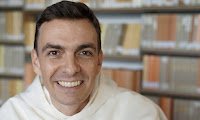Dietrich Bonhoeffer, letter of 13 September 1943 to his parents Karl and Paula Bonhoeffer, Letters and papers from prison: an abridged edition, new & greatly enlarged ed., ed. Eberhard Bethge & trans. Reginald Fuller, Frank Clarke, et al., as rev. John Bowden (New York: Macmillan Publishing Co., Inc., 1971), 109.
"In normal life one is often not at all aware that we always receive infinitely more than we give, and that gratitude is what enriches life [(Dankbarkeit macht das Leben erst reich)]. One easily overestimates the importance of one's own acts and deeds, compared with what we become only through other people."
Thursday, November 24, 2022
"it is only with gratitude that life becomes rich"
Injustice
"The law [of men] is unjust and inequitable. Why have they chastised the woman and left the man unpunished? The wife who has dishonored the bed of her husband is an adulteress, and the consequence of this are for her the harsh sanctions of the law; on the contrary, the husband who is unfaithful to his wife incurs no punishment. I do not accept this legislation; I do not approve of this custom. It is men who have legislated in this way; that is why this legislation is directed against the woman. . . . God does not act thus."
St. Gregory of Nazianzus (329-390), Oration 37.6, as translated from the French of SC 318, 283-285, as reproduced in an article I read.
True freedom
 |
Fr. Thomas le Taillandier de Gabory, O.P., "Gender: laissez le 'sexe primer'!," Bulletin de littérature ecclésiastique 116, no. 3 (July 2015): 125 (117-130), translation mine. Fr. de Gabory, Ph.D. and S.Th.D., is also a doctor engaged in medical research. From p. 121:
Above all, and this is the essential thing, there is a real plasticity of the brain. This is a major discovery. The brain is a dynamic organ of great plasticity. . . . The brain is therefore a plastic organ, but it is in reality the [integrally] whole [human] being who is plastic. Here science rejoins the [Christian] faith. God always gives the person a chance to be converted. Nothing is ever determined. Man is never condemned to remain in evil. It is thus that, until his last breath, [a] man can change; his brain and the whole of his entire being are supple, dynamic, plastic.
Monday, November 21, 2022
"the blessed, ever-virgin Mary, dwelling-place of the Holy Spirit"
 |
| Barbara Brocato |
"Deus, qui beatam Mariam semper Virginem, Spiritus Sancti habitaculum, hodierna die in templo praesentari voluisti: praesta, quaesumus, ut, eius intercessione, in templo gloriae tuae praesentari mereamur. Per Dominum . . . in unitate eiusdem."
Collect for the the Presentation of the BVM on 21 November, Tridentine missal. This prayer was completely re-written after Vatican II, and now lacks the lovely phrase above, which echoes Eph 2:22 at least (for habitaculum occurs 48 times in the Vulgate):
Now therefore you are no more strangers and foreigners; but you are fellow citizens with the saints, and the domestics of God, built upon the foundation of the apostles and prophets, Jesus Christ himself being the chief corner stone: in whom all the building, being framed together, groweth up into an holy temple in the Lord. In whom you also are built together into an habitation of God in the Spirit.
Ergo jam non estis hospites, et advenae: sed estis cives sanctorum, et domestici Dei, superaedificati super fundamentum apostolorum, et prophetarum, ipso summo angulari lapide Christo Jesu: in quo omnis aedificatio constructa crescit in templum sanctum in Domino, in quo et vos coaedificamini in habitaculum [(κατοικητήριον)] Dei in Spiritu.
Cf. Lk 1:35.
"Christ in his mercy . . . did not wish to be alone as the Son"
St. Augustine, Sermon 72A.8 (417/418), as trans. Liturgy of the hours for the Feast of the Presentation of the BVM. WSA III/3, trans. Edmund Hill (1991), 288. Latin from Miscellanea Agostiniana 1 (1930), 163 ll. 13-16 (155-164):
I can understand brothers, I can understand sisters; it's because there is one inheritance, and therefore Christ in his mercy, while being the only Son, did not wish to be alone as the Son, but wished us to be heirs of the Father, his own fellow heirs. That inheritance, you see, is such that it cannot be reduced in value by any number of co-heirs.
fratres intellego, sorores intellego: una est enim hereditas; et ideo Christi misericordia, qui, cum esset unicus, noluit esse solus, voluit nos esse Patri heredes, sibi coheredes.


